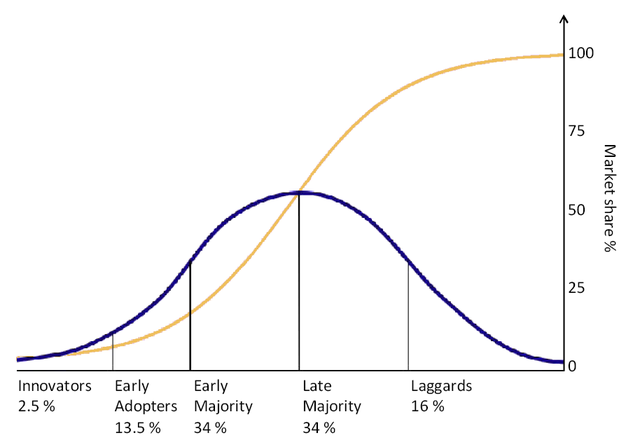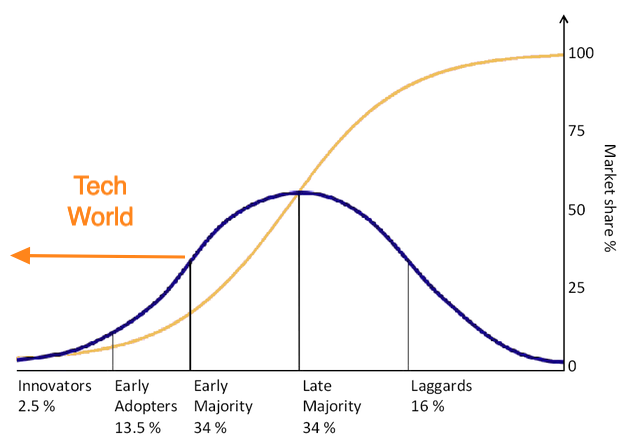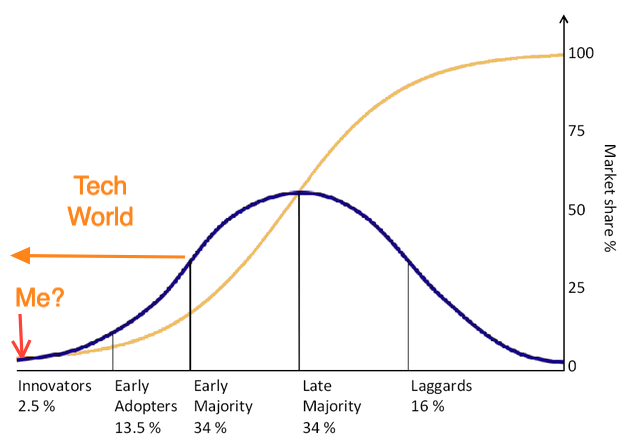Leaning Into The Future For Fun (And Profit?)

I can feel the future. Just like how this guy can pick the best music in the world just by feeling it.

Actually no, I think I can, but I am not sure whether its even remotely true. So a good fall back is to have fun and try it out.
Living the future
The tech world (primarily the SF Bay Area) lives anywhere from 5 to 10 years into the future compared to the rest of the world. Uber was "mainstream" in the tech world first by a few years. So was Facebook, Google, Amazon etc. The list is endless.
As of 2024, Waymo is on the same trajectory as Uber. Most of the world does not think of this as the future. The SF Bay Area knows it. I know that Waymo is the future too. I can feel it. Its our destiny.
So are Space Factories and Space Mining. Cyberpunk is already here and its boring. Humans are close to becoming immortal. The Future of War is robots. More people will be killed by robots in the 21st century than by humans. More people's lives will be saved medically by robots than by humans. So many thoughts to be written down!
Anyways, coming back to the present. There is a well known "adoption curve" of new technology as shown below.

Most of the tech world lives on the left part of the curve "Early Adopters" and to left of it.

Within the tech world, some people live anywhere from 1 - 5 years into the future compared to the tech world. These people are on the extreme left of this curve and have an instinct of how the future will pan out.
I have a sneaky feeling I might be one of them.

I want to see if its true. But more importantly, I want to have fun while doing it. So I am doing it publicly.
I have frequently been way too early into the future, recognize it is the future, but I never did anything about it. I did not lean into the future.
I want to now lean into the future. And have fun (very important to have fun) while doing it.
Few anecdotes below. The list is not a brag, but a validation of all the things I saw coming but regretfully never did anything about it. Not even write about it. 😔
Bitcoin in Spring 2011
As a CS student at Cornell in 2011, I started mining for something called Bitcoin on my dinky Lenovo laptop via the CPU. I also discovered the earliest instances of mining pools for mining. It was a completely new thing and I was excited to be part of it.
I kept the mining software running for about 12 hours and realized that CPU would not just cut it for the amount of hash / sec required for. The world already had moved onto GPUs as the base way of mining. I did not have the money to buy a GPU. My parents had taken loans to pay for my education and I could not afford the distraction of going after a fun new thing of "cryptocurrency" that had not become mainstream in the tech world (let alone all of the world).
So I abandoned it and finished my degree and started working at Funzio - a gaming startup out of SF.
jQuery in 2008-2009
I was in undergrad in India at that time. I had heard about jQuery online and started working with it and immediately started using it for all my personal web projects. I was the only one in my year at that time who cared enough to learn it and deploy it.
I then proceeded to party with my friends, and not do anything else.
MLOps in 2012
In Cornell, I had specialized in NLP (Natural Language Processing) and Machine Learning in 2011. Back then there was SVM and LDA and nary a Deep Neural Net in sight. I knew that ML was being adopted by some tech companies but that it was hard to do and finicky to run. This was preventing companies from using ML to solve their problems. I saw so many problems within the company I was working at as well as outside.
So I decided to build a website to solve it. It was called "SoothSayr.com".
I built the landing page. Submitted to google for indexing, hoping people searching for solutions would turn up and click the sign up button.
And then I did nothing else.
I felt so strongly about this and yet... I did nothing else.
I did not know what else to do. I did not put in the effort to figure out how to grow a startup, did not bother applying to YC. I did not talk to my fellow engineers. Did not talk about this idea with my mentors, who were founders themselves and who could have guided me.
To this day, I regret that I did not put more effort into exploring it, talking about it or actually pushing for it.
Obviously I got zero traffic because I did not do anything for distribution of this. So I abandoned it in a couple of weeks not asking what I could do next to grow it.
Let the journey begin
As I said, I can feel the future. Just like he can feel the music.

I am going to make predictions of how the world will progress. But very specifically it will be on either 2, 5 or 10 year timeline from the point of prediction. The fun part is to track it, celebrate the wins and celebrate the losses too!
The predictions will be a mix of tech, hardware, software, maybe some politics etc. The more entertaining the predictions are, the better it is.
Come join me in this journey which will mostly consists of making a fool of myself, but lets also have some fun on the way.
A footnote on failed predictions
Again, this is anecdotal. I do have several examples of "leaning into the future" where I got the predictions wrong. But the point is to get some of them right rather than focus on preventing wrong ones. If the downside of the wrongs is less, but the upside of right is much much more - the failures don't matter.
Examples -
- Shoutt (2012): a startup I worked on for 1 year. SoLoMo baby! It was a failure baby!
- Stripe will succeed in India and obliterate Indian Payment Providers (2016): Stripe failed so badly that they are went back to "Invite Only" (from May 2024) for India with no timeline on opening back up. My personal experience with Stripe India was very disappointing too.
- UPI will not be big thing in India (2016) - Mega wrong! UPI is now equivalent to cash. Unthinkable in India circa 2016.
- iPad (2010) will fail - I am so embarassed about this is, so I am going to stop writing this list now.
There are countless other examples where I got things wrong too.
Thanks to Paulami Sen, Mansi Gandhi and Neehar Cherabuddi for reading drafts and giving feedback.




